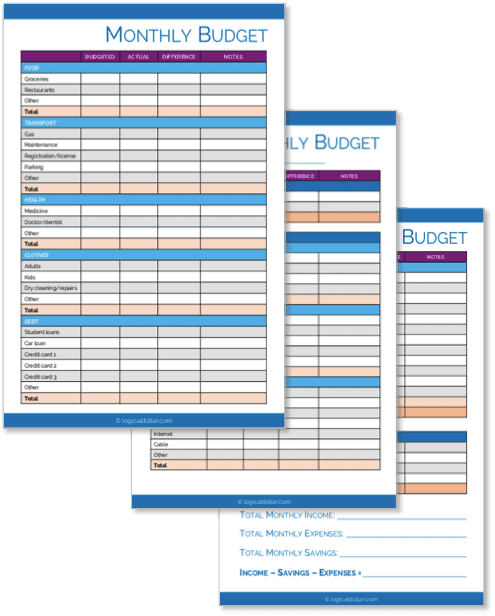The word “stingy” hardly conjures up positive images of anyone. After all, it’s rarely, if ever, a compliment. That said, what if we could take the ideas behind living stingy and use them to our advantage?
These ideas usually refer to someone being cheap, in that they’re unwilling to spend money on anything unless they absolutely have to.
But that’s also the exact attribute that many people have (or should have) when they’re trying to turn their finances around.
And with so many people spending far more than they have to sustain a lifestyle that they can’t afford, is “living stingy” really so bad?

TAKE BACK CONTROL OF YOUR FINANCES
Our free budget planner will help you to quickly and easily take control of your money – instead of it controlling you.
Get it free for a limited time!
You’ll also join our mailing list to get updates on how to manage your money – unsubscribe at any time at the end of each email.
What does living stingy involve?
Living stingy will involve different things for different people but, broadly speaking, it generally means living on an extremely tight budget.
This likely means only buying things when you need them and probably only when they’re on sale or when a coupon is available. Otherwise, you’ll simply go without.
Really, when you break it down, it comes down to being mindful of how you spend every dollar.
Which doesn’t sound so bad when it’s worded like that, right?
To put it another way, it’s clear that calling someone “stingy” is definitely meant as an insult.
But if we reframe it to see it as referring to someone who’s extremely careful about their spending, you may start to see that it doesn’t have to be a bad thing.
If anything, it’s the opposite, as it’s acknowledging someone’s ability to be thrifty and effectively manage their finances.
Related: How to Get Rich From Nothing: The One Strategy That’s Proven to Work
Living stingy or living frugal?
There isn’t much of a difference between the concepts of living stingy and living frugal, except that one is definitely meant as more of an insult than the other.
But when you break it down, the similarities are clear.
Controlling your spending? Check.
Only buying things you absolutely need? Check.
Not wasting your money and making sure every dollar is being put to good use? Double check.
So stinginess and frugality are the same?
You could argue that being stingy is more of an extreme version of frugality.
For example, someone who’s being frugal may only go out for dinner with friends on Cheap Tuesdays whereas someone who’s stingy may not go out at all.
That said, periods of stinginess aren’t necessarily a bad thing. If you’re really focused at the moment on paying off your credit card debt, it may be a good time to not go out for a while and make sure every dollar is being used to blast the balance on your card.

It’s probably not ideal to live like this forever, though. We only get one life, after all, and managing your money shouldn’t have to be at the expense of your happiness for the rest of your days.
But living stingy for a while can be a great way to get your finances in order.
When shouldn’t I be living stingy?
The exception is if someone’s stinginess or frugality crosses the line into being mean or somehow affecting the lives and finances of others.
A classic example is the person who goes out for drinks with a group of friends and then, when it’s their turn to buy a round, they suddenly disappear.
Don’t be that person. No one likes that person.
So it’s perfectly fine to watch your spending and even, if things call for it, really woking to drastically cut your expenses.
Just make sure it’s not at the expense of your relationships with friends and family.

MANAGE YOUR MONEY LIKE A BOSS
Managing your money effectively can literally change your life. And starting a budget using our budget planner is the first step towards you doing just that.
Get it free for a limited time!
You’ll also join our mailing list to get updates on how to manage your money – unsubscribe at any time at the end of each email.
Pros and cons of living stingy
There are both advantages and disadvantages to living stingy, many of which may be obvious.
But setting out the pros and cons like this may help you see that the benefits really do outweigh the negatives of living like this, even just for a while.
Pros
You’ll save more money
If you’re only spending what you truly need in order to live, it’s pretty clear that you’ll have more money left over – and if you save money, you can live better. In particular, you’ll easily be able to improve your savings rate compared to before.
You can focus on your financial goals
By making sure that every dollar is being used to its absolute advantage, you’ll be able to assign more of your money to hitting those financial targets.
Whether you’re looking to pay off debt quickly, including to improve your credit score, or contribute more to your 401(k), living stingy can help to maximize your work towards these goals.
You’ll budget better
The biggest problem that people have when trying to stick to a budget is that their money doesn’t end up being spent where they planned.
But for someone who’s living stingy, they’re already in the mindset of keeping an eye on exactly where all their money goes. Meaning that someone living like this is going to have much better chance of budget success than otherwise.
You’ll be better prepared for a money emergency
Nasty financial surprises can strike at any time. And with almost one third of adults having no emergency savings at all, many of us are one emergency away from financial danger – like, say, if you have to live without a job for some time.
So with the increased savings that come from living stingy, some of that money can definitely be put towards setting up an emergency fund.

Your bills will always be covered
The stress of not knowing if you’ll have enough to cover all your bills at the end of the month is something you should avoid at any cost. Unfortunately, this is a major issue for many households.
So by embracing a period of living stingy for a while, you’ll be able to use this time to really get your bills under control.
Greater appreciation for what you do buy
If you’ve decided to live stingy, then you’re going to be buying far less than otherwise.
But a surprising effect of this is that it will really help you appreciate the things you do end up buying.
Think about it: someone who buys a new pair of shoes every month may get a short rush from their purchase. But someone who does their research and waits for a sale to buy one pair every six to twelve months is going to have a true appreciation for those shoes going forward.
Cons
You may have to miss out
If you’re choosing to spend less than others around you, then it’s inevitable that you may have to miss out on some activities that they do that cost money.
This doesn’t mean that you have to cut out all social activities though. Find some low-cost (or no-cost) things to do to make sure you can maintain some sort of social life.
For example, going out for dinner may be off the cards if you’re living stingy. So why not try a potluck dinner with friends at home where everyone contributes a dish?
Others not understanding your choices
It’s not fun to explain to others that you’re changing your spending habits in a fairly extreme way.
They may not understand why you’re doing it, especially if they can’t see any obvious need in your life.

They could also see it as an accusation against themselves – as if you’re disapproving of the way they live and manage their money.
This is why it can be better to explain your decision to live stingily in a way that focuses more on your efforts to better manage your money, rather than a simple explanation of “I don’t want to spend more”, which can easily be misunderstood or leave you open to (unfounded!) criticism.
You’ll have to set boundaries
Any effort to revamp your finances will inevitably involve setting boundaries – both for yourself and others.
If you used to buy a coffee on the way to work every day, that will now be off limits.
Or if you went to brunch every Sunday with your friends, you’ll now have to cut that way back to once a month, or even less.
This won’t always be well received by those around you and could be even harder for you to cope with.
Just keep in mind why you’re doing this. Whichever financial goal you’re striving for will always make your hard work in setting boundaries worth it.
Getting carried away
This is definitely something you want to avoid.
Good money management is key to a good life – but you don’t want it to be at the expense of you having any life at all.
It’s important to find a balance between being stingy and being downright cheap.
Remember the earlier example of the person who skips out on buying rounds when it’s their turn? This is taking it all too far.
The important thing is to find alternatives to some of your previous life habits that are more in line with your new, positive financial mindset.
So instead of going out for drinks with friends to a place that’s outside of your new budget, why not host a drinks night at someone’s house where everyone has to bring a bottle of something that’s $5 or less.
That way, you’ll still get to socialize and watch your money, without completely turning off your friends in the process.
How to be stingy
Remember, the aim of all of this is to watch your money but not be cheap. It can be a fine line to manage, but it doesn’t have to be hard to follow, especially with these tips.
Related: 17 Best Financial Planning Quotes to Inspire Your Money Makeover
1. Put a financial plan in place
One of the major benefits of living stingy is that it makes it much easier to achieve your financial goals. It can also be far more rewarding to, say, pay off all your credit card debt than spending your money who-knows-where.
However, you’re not going to be able to achieve those goals if you haven’t set them in the first place and if you don’t have a plan in place to get to the top of that money mountain.
A great place to start for figuring out your financial goals is to think of why you want to achieve them.
For example, it’s not just about contributing money to your retirement fund. It’s because you want to be able to retire comfortably at the age of 65.
And once you’ve figured out what goal you want to meet, think of small, measurable, achievable steps to get there.
That way, you’re giving yourself the greatest chance of success!
Related: The Personal Financial Plan Example You Can Use To Reach Your Financial Goals
2. Set up a budget (and stick to it)
If your aim of living stingy is to make sure you know exactly what every single dollar is doing, then having a budget can be a great way to do this.
By putting your budget plan down on paper, you’ll be able to really ensure that your money is going exactly where you want it to.

MANAGE YOUR MONEY LIKE A BOSS
Managing your money effectively can literally change your life. And starting a budget using our budget planner is the first step towards you doing just that.
Get it free for a limited time!
You’ll also join our mailing list to get updates on how to manage your money – unsubscribe at any time at the end of each email.
3. Re-evaluate your spending habits
Even the most money savvy people among us have areas where we could fix our spending habits. So take a good look at yours to see where you could be spending more than you realized.
And once you’ve found some gaps in your money management, it’s time to establish new and improved habits.
For example, do you buy lunch at work a “only” couple of days a week – which “only” costs $10 each time? Time to rein that in and make sure you’re bringing lunch from home every single day.
A great way to make this work is to create a habit tracker. There are tons of free apps that do this or you could even just use a calendar.
Whichever method you choose, seeing yourself progress day after day can be super motivating.
You may also be interested in: 11 Great Ways to Save Money Without a Bank Account
4. Only buy things that are on sale
In addition to the normal sales that stores have from time to time, there are now dozens of websites offering discounts on almost anything you can imagine. I don’t buy anything anymore without checking these first.
For me, Swagbucks is the best app out there for getting cash back on basically anything you buy (and that free $5 sign up bonus is pretty good too).
How it works is that it gives you a percentage of what you spend at any of the 500,000 outlets it covers – including both in-person and online shopping. This essentially means that it’s a built-in discount on practically anything.
Related: Best Amazon Gift Card Deals to Get Free Amazon Credit
And the best part is that I choose to get paid out through PayPal, which means they’re essentially giving me straight up cash.
Swagbucks
Free sign-up bonus: $10
A great app for making extra money, including with cash back from online shopping, watching videos, playing games and more.
And given it’s paid out over $550 million through Amazon, Paypal and other gift cards, it’s 100% legit.
And you can take this a step further by checking what free options are available if you need to replace something in your life. Check out some of our articles on this to help you:
- 43 Simple Ways to Get Free Books Mailed to Your Home
- 12 Simple Ways To Get Free Shoes Sent To Your Door
- 17 Easy Ways to Get Furniture for Free
5. Cut subscriptions you don’t need
Most people have subscriptions to things that they don’t really use anymore – but have always forgotten to cancel before the next month is billed.
So go through your bank statement and check what you’re being regularly billed for. The next step is to cancel those you don’t actually need.
Reducing recurring expenses is one of the best ways to save money in the long term, so cancelling subscriptions can have a huge effect on how much you’re saving.
6. Review your bills
It’s far too easy to just stick with a bill provider because it can seem too hard to change, but if another provider is offering a better offer, then taking a few minutes to call your current one can really be worth it.
You can either switch to the cheaper provider or use the knowledge of the cheaper offer to negotiate a difference with your current one.
Similarly, make sure the services being provided by your bills are actually what you need.
For example, many of us have much faster internet packages than what we actually use. Or perhaps you’re paying for a cell phone contract with more data than you’ll ever use.
Related: Leasing a Phone vs Buying It: Which Is Best For You?
All of these offer money-saving opportunities, so see what you can do.

7. Find free entertainment options
Entertainment costs can be another huge portion of our budgets. It may even be something that you think you “need” but, with a bit of creativity, you’ll soon see that there are plenty of free ways out there to have a good time.
Why not go for a hike in your local national park or see if there are any free classes in your area?
Or you could find out if there are any free “come and try” days for a new sport nearby or even wander around a local market (if you trust yourself not to spend anything).
You can also find some ideas that are closer to home, like having a movie or games night with friends, learn a new skill on YouTube or have a home spa day.
8. Bring your lunch to work
Buying lunch every day at work can seriously add up. For just a little bit of convenience, many of us are paying $10 or even $20 per day – which adds up to literally thousands of dollars over the course of a year.
This means that taking the time to prepare your lunch the night before – or even to meal prep over the weekend – can have a huge impact on your spending habits.
9. Meal plan and use a shopping list
Food costs often take up a huge portion of our overall budget so seeing how to reduce these can be key for anyone looking to live stingy.
For this, meal planning can be a lifesaver. And when combined with only going to the supermarket with a shopping list – making sure you’ll only buy exactly what you need to get you through the week – this is an area that can save you thousands of dollars.

10. Buy in bulk
Professionals at being stingy will tell you that buying in bulk can be a game changer.
By getting all of your non-perishables in bulk, you’ll be further lowering your spending on items that you’d normally be buying every week or so at the supermarket – for a higher price.
11. Stop eating out
We’ve mentioned several times that living stingy shouldn’t mean that you don’t have any fun at all.
At the same time, eating takeaway regularly or even going to restaurants can put a big hole in your budget.
Finding alternatives, like cooking at home or even making something and then heading to a park for a picnic with friends, can be just as fun – for a fraction of the cost.
Related: 54 Frugal Living Tips to Save You Money
12. Buy generic brands
One study found that Americans could save $44 billion a year if they switched to buying the exact same generic products instead of name brand items.
This doesn’t only apply to kitchen basics, like salt, sugar and milk, but also pharmaceuticals and cleaning products.
So when there’s no difference between your “usual” name brand product and its generic equivalent, try switching over to save more on your shopping each week.
13. Refinance your debt
If you carry any debt, you should do everything you can to minimize the repayment conditions to help you get rid of it as quickly as possible.
A great way to do this can be to consolidate and refinance it. If you’re eligible, lowering your interest rate can literally save you tens of thousands of dollars over the life of the loan. This can be perfect if you have some serious savings goals, like trying to save $10,000 in a year.
You could also look into doing a balance transfer. Just keep an eye on the fees, pay off as much of the loan during the interest-fee period as possible and make sure that the terms that apply after that period are reasonable.

14. Downsize your home
This can be hard to do if you own your home but if it’s possible, especially if you rent, look into moving somewhere smaller in order to save a ton.
Not only will you save money on the rent or mortgage by having a smaller (and presumably cheaper) place, but you’ll also be spending less on things like heating and cooling, property taxes and energy costs.
Related: What’s the Cheapest Way to Live: Where to Move Abroad and 21 Other Cheap Living Tips
15. Get a housemate
Getting a housemate can be an easy way to get someone to help pay your rent or mortgage, if you have the space available for this.
16. Move in with family
This isn’t an option for everyone, but if it is for you, moving in with family for a little while can really help you to save money on accommodation costs.
This doesn’t have to be forever but if you need some time just to get back on your feet financially, consider moving back home for enough time to get your finances in order.
17. Get around by bike or on foot
Owning and operating a car is expensive. So if it’s feasible where you live, consider walking or riding as much as you can to get around.
Not only is it better for your health, but your wallet will be thankful too.
It may take some adjustments. Trust me, I sold my car eight years ago to switch to biking to and from work and there’s certainly a period where you miss the convenience of having a car. But since then, I seriously haven’t looked back.

18. Downgrade to a one-car (or no-car) household
If you’re in a two (or more) person household, you may own more than one car for convenience. That said, it’s pretty unlikely that you actually need both of them.
So with some adjusting of your schedules, you should be able to manage with only one – or even none!
19. Take public transport
If bike riding isn’t an option for you, try taking public transport to get around or even just for your commute to work.
The amount you’ll save on parking alone, especially if you work in the center of a city, will be a small fortune. Not to mention how much you’ll save on things like gas and car maintenance.

20. Learn how to do your own grooming/beauty
If you’re the kind of person who gets $150 highlights every six weeks or just has to go for their weekly manicure, then you may want to rethink this.
Suffice to say, these expenses can seriously add up. In fact, according to this article, women in the US spend an average of $3,756 a year on their appearance.
Fortunately for us, YouTube is a goldmine of tutorials for how to do these things yourself. With a bit of practice, you can be just as good as the salon you’re used to going to – all with the convenience of being able to do it at home.
21. Shop secondhand
Living stingy involves only buying exactly what you need. So even if this limits you from going on clothing spending sprees like you may be used to, you’ll still need new clothes from time to time.
And when those times arise, check out your local second hand stores. There can be some amazing finds in there, including clothes that have never been worn and brand name items you’d never want to pay full price for.
22. Get a side hustle
This new lifestyle doesn’t only involve spending less to use your money more effectively. It also involves finding ways to make more money so you have even more cash to put towards your financial goals.
One great way to do this is to start a side hustle that you can do in your spare time.
Maybe you have a particular skill that you can use to make things to sell or or a specialization that you can teach others.
Freelancing from home may also be a good option for you. For example, do you have strong attention to detail? Why not try editing online. Or maybe you have strong writing skills? Content writing can be a really lucrative job on the side.

23. Sell unused items
Similar to the above, another way to make some extra money is to look around your house and see what you have that you don’t use anymore.
Your trash will definitely be someone else’s treasure, so why not clear out your garage or your basement and see what you find. Then simply put your unused items on a site eBay or Facebook Marketplace to get some extra cash this month – with the added bonus of a much tidier storage area.
Is living stingy worth it?
The benefits of living stingy should be clear by now.
Simply put, you’ll save a ton of money and be able to focus all your efforts on achieving your financial goals.
There are some downsides and you may have to make a few hard sacrifices, especially if your spending has been a bit out of control in the past.
But the satisfaction of knowing you’ve paid off your debt or that you’ve saved up for your dream holiday should more than make up for any activities you’ve had to miss out on while embracing your new money mindset.
Why you should consider living stingy
You should definitely consider this if you think your spending needs an overhaul. Sometimes going (almost) cold turkey can be just what you need to put you on the path to financial success.
This should also be an option for you if you have clear financial goals that you’ve been struggling to achieve. If you’re in debt and have been trying to get rid of it but nothing has been working, living stingy may be just what you need to make sure every single dollar is going towards this goal.
At the same time, be cautious at doing this for a long time. It can be a great short term strategy for making over your money mindset, but planning to do this long term will be difficult and could see you accidentally crossing the line into “cheap”.
Also keep in mind that the aim of better financial management is to make your life better.
That isn’t to say that you necessarily need to spend money to improve your life.
But some reasonable, targeted spending can let you do the things that bring you joy. If your plan is to cut out all spending except for the essentials forever, you’re going to have a bad time.
On the other hand, if living a bit stingily today can bring you greater financial security tomorrow, then this is definitely something you can embrace for a while.

READY FOR MORE?
Join thousands of subscribers in getting regular tips in your inbox on how to take control of your finances and save more money – and, for a limited time, get our free budget planner as a gift!
You’ll also join our mailing list to get updates on how to manage your money – unsubscribe at any time at the end of each email.






